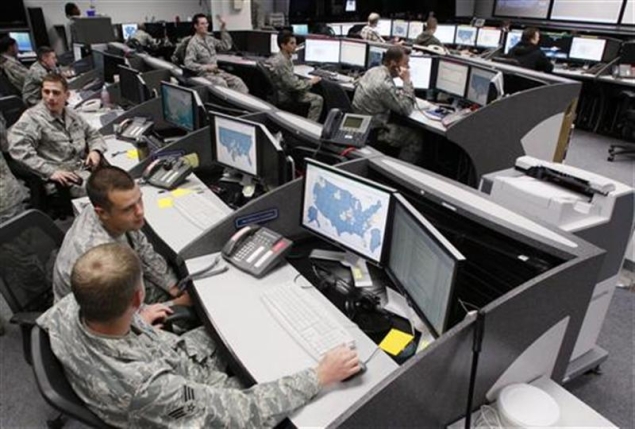- Home
- Internet
- Internet News
- Cyber war targets Middle East oil companies
Cyber war targets Middle East oil companies

The United States and Israel, believed to behind the first cyber sabotage campaign that targeted Iran's nuclear programme, are now worried about becoming targeted themselves.
"There have been increasing efforts to carry out cyberattacks on Israel's computer infrastructure," Prime Minister Benjamin Netanyahu said earlier this month, without giving details.
Netanyahu spoke just days after Washington issued a veiled warning to Iran over digital attacks and outlined a new digital warfare doctrine.
US Defense Secretary Leon Panetta also referred publicly for the first time about the "Shamoon" virus that hit Saudi Arabia's state oil company Aramco in August, disabling more than 300,000 computers.
The virus also hit Rasgas, a joint venture between US oil firm Exxon Mobil Corp and state-controlled Qatar Petroleum.
Panetta called the sophisticated virus "the most destructive attack that the private sector has seen to date."
It took Aramco, the world's biggest oil company, two weeks after the August 15 attack to restore its main internal network, but the group said that oil production had not been disrupted.
However the threat that digital attacks could cripple vital infrastructure is real, with Panetta warning of the possibility of a "cyber-Pearl Harbor" to justify a policy of moving aggressively against threats.
A disruption to Saudi Arabia's oil exports could cause oil prices to spike from their already elevated prices and tip the fragile global economy into recession.
In what was interpreted as a veiled threat against Iran, Panetta said the US military "has developed the capability to conduct effective operations to counter (cyber) threats to our national interests."
A senior US administration official, who spoke on condition of anonymity, told AFP the cyber attack on the Gulf oil giants was believed to be carried out by a "state actor" and acknowledged that Iran would be a prime suspect.
US officials have "more than a suspicion" that Iran was to blame for the August attacks, said James Lewis, who has worked for the State Department and other government agencies on national security and cyber issues and who is now a senior fellow at the Center for Strategic and International Studies think tank.
He said the US authorities were used to cyber espionage from Russia and China, but were surprised by the swift rise in Iran's digital warfare capability.
Get your daily dose of tech news, reviews, and insights, in under 80 characters on Gadgets 360 Turbo. Connect with fellow tech lovers on our Forum. Follow us on X, Facebook, WhatsApp, Threads and Google News for instant updates. Catch all the action on our YouTube channel.
Related Stories
- Samsung Galaxy Unpacked 2026
- iPhone 17 Pro Max
- ChatGPT
- iOS 26
- Laptop Under 50000
- Smartwatch Under 10000
- Apple Vision Pro
- Oneplus 12
- OnePlus Nord CE 3 Lite 5G
- iPhone 13
- Xiaomi 14 Pro
- Oppo Find N3
- Tecno Spark Go (2023)
- Realme V30
- Best Phones Under 25000
- Samsung Galaxy S24 Series
- Cryptocurrency
- iQoo 12
- Samsung Galaxy S24 Ultra
- Giottus
- Samsung Galaxy Z Flip 5
- Apple 'Scary Fast'
- Housefull 5
- GoPro Hero 12 Black Review
- Invincible Season 2
- JioGlass
- HD Ready TV
- Latest Mobile Phones
- Compare Phones
- Realme P4 Lite
- Vivo V70
- Vivo V70 Elite
- Google Pixel 10a
- Tecno Camon 50
- Tecno Camon 50 Pro
- Lava Bold N2
- Vivo V60 Lite 4G
- LG Gram 14 (2026)
- Asus Vivobook 16 (M1605NAQ)
- Infinix Xpad 30E
- Brave Ark 2-in-1
- Amazfit T-Rex Ultra 2
- boAt Chrome Iris
- Xiaomi QLED TV X Pro 75
- Haier H5E Series
- Asus ROG Ally
- Nintendo Switch Lite
- Haier 1.6 Ton 5 Star Inverter Split AC (HSU19G-MZAID5BN-INV)
- Haier 1.6 Ton 5 Star Inverter Split AC (HSU19G-MZAIM5BN-INV)
-
 Samsung Galaxy S26 Ultra Seen Alongside iPhone 17 Pro Max as YouTuber Purchases Handset Ahead of Galaxy Unpacked
Samsung Galaxy S26 Ultra Seen Alongside iPhone 17 Pro Max as YouTuber Purchases Handset Ahead of Galaxy Unpacked
-
 LG Gram 14 (2026) With Up to AMD Ryzen AI 7 450 Processor, 72Wh Battery Launched: Price, Features
LG Gram 14 (2026) With Up to AMD Ryzen AI 7 450 Processor, 72Wh Battery Launched: Price, Features
-
 Samsung Galaxy S26 Ultra Retail Unit Surfaces Ahead of Unpacked Event, Highlighting Privacy Screen Feature
Samsung Galaxy S26 Ultra Retail Unit Surfaces Ahead of Unpacked Event, Highlighting Privacy Screen Feature
-
 Samsung Galaxy S26 Ultra Marketing Images Leaked; Could Arrive Without Battery, Camera Upgrades
Samsung Galaxy S26 Ultra Marketing Images Leaked; Could Arrive Without Battery, Camera Upgrades




![[Partner Content] OPPO Reno15 Series: AI Portrait Camera, Popout and First Compact Reno](https://www.gadgets360.com/static/mobile/images/spacer.png)





